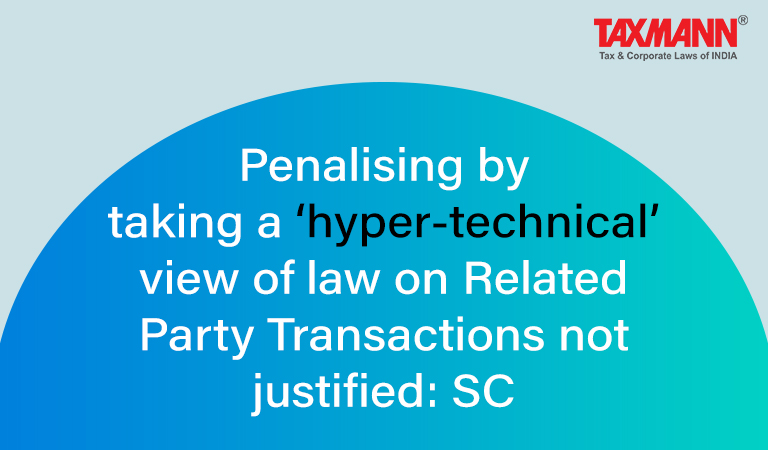Penalising by taking a ‘hyper-technical’ view of law on Related Party Transactions not justified: SC
- Blog|News|Company Law|
- 2 Min Read
- By Taxmann
- |
- Last Updated on 2 May, 2022

Case Details: Securities and Exchange Board of India v. R.T. Agro (P.) Ltd. - [2022] 137 taxmann.com 496 (SC)
Judiciary and Counsel Details
-
- Dinesh Maheshwari and Aniruddha Bose, JJ.
- S. Niranjan Reddy, Sr. Adv. Abhishek Baid, Anup Jain, Ashok Kr. Jain and Praneet Das, Advs. for the Appellant.
- Pesimodi, Sr. Adv. Neville Lashkari, Ms. Samriti Ahuja, Advs., Lakshmeesh S. Kamath and Joby Mathew, AOR for the Respondent.
Facts of the Case
In the instant case, a company ‘R. T. Exports Limited’ proposed to enter into a transaction with ‘Neelkanth Realtors Private Limited’ for the purchase of 40,000 sq. ft. of residential space. This proposal was treated as a related party transaction and was required to be approved by the shareholders of the Company.
Accordingly, a special resolution was approved by R. T. Exports Limited. In terms of Section 188 of the Companies Act, 2013, the related parties abstained from voting on this special resolution. Thereafter, an Extra-Ordinary General Meeting was convened for rescinding the resolution in which, the related parties also voted.
However, the appellant-SEBI took up the matter on a complaint and issued notice alleging violation of Regulation 23 of the SEBI (Listing Obligations and disclosure Requirements) Regulations, 2015. The Adjudicating Officer, ultimately, proceeded to penalise the present respondents with a cumulative sum of Rs. 35 lakhs for the alleged violation of the said Regulation 23.
The Securities Appellate Tribunal dismissed the order passed by the Adjudicating Officer and allowed the appeal holding that the bar of voting as per Section 188 of the Companies Act, 2013 on related parties operated only at the time of entering into a contract or arrangement, i.e., when the resolution was passed; and therein the said related parties indeed abstained from voting. The Appellate Tribunal found no fault in the said parties voting in the recalling/rescinding of the said resolution.
Supreme Court Held
On further appeal, the Apex Court held that the SEBI was not justified in taking a ‘hyper-technical’ stance imposing a penalty on the company for the related party voting on a resolution rescinding an earlier special resolution authorising entering into a contract with him, where the related party had abstained from the vote on the earlier special resolution in his favour and no ill-intent on part of the company was established.
The Court held that the view taken by SAT in the given facts and circumstances of the case is to be upheld as it appeared to be a plausible view of the matter since no ill-intent on the part of the respondents (company) was established. It was held that the SAT had rightly disapproved of the hyper-technical stance of SEBI. SEBI’s present appeal failed and therefore be dismissed.
Disclaimer: The content/information published on the website is only for general information of the user and shall not be construed as legal advice. While the Taxmann has exercised reasonable efforts to ensure the veracity of information/content published, Taxmann shall be under no liability in any manner whatsoever for incorrect information, if any.

Taxmann Publications has a dedicated in-house Research & Editorial Team. This team consists of a team of Chartered Accountants, Company Secretaries, and Lawyers. This team works under the guidance and supervision of editor-in-chief Mr Rakesh Bhargava.
The Research and Editorial Team is responsible for developing reliable and accurate content for the readers. The team follows the six-sigma approach to achieve the benchmark of zero error in its publications and research platforms. The team ensures that the following publication guidelines are thoroughly followed while developing the content:
- The statutory material is obtained only from the authorized and reliable sources
- All the latest developments in the judicial and legislative fields are covered
- Prepare the analytical write-ups on current, controversial, and important issues to help the readers to understand the concept and its implications
- Every content published by Taxmann is complete, accurate and lucid
- All evidence-based statements are supported with proper reference to Section, Circular No., Notification No. or citations
- The golden rules of grammar, style and consistency are thoroughly followed
- Font and size that’s easy to read and remain consistent across all imprint and digital publications are applied



 CA | CS | CMA
CA | CS | CMA
